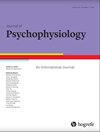神经质对斜方肌和额肌对预期应激反应的影响
IF 0.9
4区 心理学
Q4 NEUROSCIENCES
引用次数: 0
摘要
摘要对工作场所的心理压力进行客观量化,有利于设计工作任务,避免心理压力带来的负面影响。表面肌电图等方法已被证明对精神需求很敏感。然而,对预期应激模式下的肌肉反应及其调节因素的了解甚少。本研究考察了人格维度神经质是否会调节肌肉对不可预测的电击预期的反应。47名受试者经历了三个预期阶段,在这三个阶段中,他们可以在两种情况下(预期第一种:电击1,第二次电击2)在不可预测的时刻期待愉快的音频信号(无电击)或电击。采用表面肌电图记录额肌活动和斜方肌上部及上/中部。研究人员使用大五人格量表对神经质进行调查,并将受试者分为神经质程度较低或较高的两组。在高神经质组中,Shock1只引起较高的斜方肌活动,而在Shock2中消失,而额肌没有明显的影响。结果表明,神经质应该被认为是使用斜方肌表面肌电图评估预期应激的调节因素。本文章由计算机程序翻译,如有差异,请以英文原文为准。
The Influence of Neuroticism on the Muscle Response in the Trapezius and Frontalis Muscles to Anticipatory Stress
Abstract. Objective quantification of mental stress in the workplace would be beneficial for designing work tasks to avoid the negative consequences of mental stress. Methods such as surface electromyography have proven to be sensitive to mental demands. However, there is little knowledge about the muscle response and moderating factors during anticipatory stress paradigms. This study examined whether the personality dimension neuroticism moderates the muscle response to the expectation of an unpredictable electrical shock. Forty-seven subjects underwent three expectation phases, in which they could expect a pleasant audio signal (NoShock) or an electric shock in two conditions (anticipation of the first: Shock1, and second electric shock: Shock2) at an unpredictable moment. The frontalis muscle activity and the upper and upper/middle parts of the trapezius muscle were recorded using surface electromyography. Neuroticism was surveyed using the Big Five Inventory to assign the subjects to a group with lower or higher neuroticism. Shock1 only induced higher trapezius muscle activity in the higher neuroticism group, which vanished during Shock2, while the frontalis muscle showed no significant effects. The results suggest that neuroticism should be considered a moderating factor in assessing anticipatory stress using surface electromyography at the trapezius muscle.
求助全文
通过发布文献求助,成功后即可免费获取论文全文。
去求助
来源期刊

Journal of Psychophysiology
医学-神经科学
CiteScore
2.60
自引率
7.70%
发文量
25
审稿时长
>12 weeks
期刊介绍:
The Journal of Psychophysiology is an international periodical that presents original research in all fields employing psychophysiological measures on human subjects. Contributions are published from psychology, physiology, clinical psychology, psychiatry, neurosciences, and pharmacology. Communications on new psychophysiological methods are presented as well. Space is also allocated for letters to the editor and book reviews. Occasional special issues are devoted to important current issues in psychophysiology.
 求助内容:
求助内容: 应助结果提醒方式:
应助结果提醒方式:


